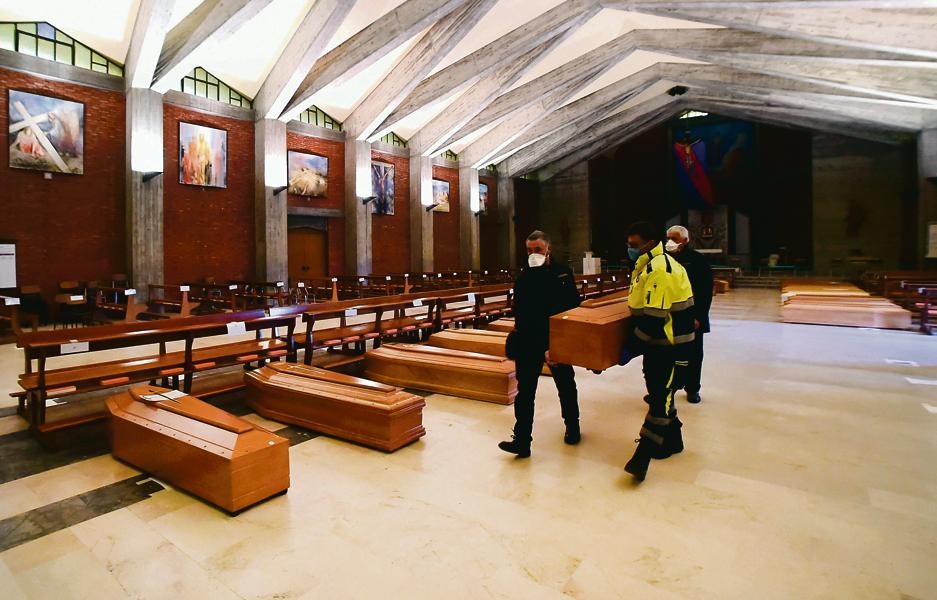
The logical proposition now is for governments to build healthcare reserve capacity, in the same way military capacity was built in the post-world war eras
The outbreak of the Covid-19 coronavirus and its global spread – with significant fatalities so far – represents the end of the world order as we know it.
The significance of the outbreak is that it is at the same proportions, if not far-reaching, as the two world wars of the 20th century.
World War 1 and World War 2 significantly defined the world order in almost all its manifestations and gave rise to the militarisation of nation states.
This was done in such a way that the collective psychology of nation states in the period after the world wars was underpinned by the need to assemble huge armaments and preparations for another war.
The post-world war periods positioned the world to expend trillions of dollars on stockpiling armaments, building geopolitical alliances and establishing command centres around the globe in anticipation of, and in preparation for, another war.
The world’s most powerful economy, the US, expends more money on its military than the nominal value of all African economies combined.
The alliances the US supports and keeps in different parts of the world are not premised on shared values, but on an imaginary anticipation that, if another war occurs, those allies will fight on the side of the Americans.
The outbreak of Covid-19 late last year illustrated that the enemy of the 21st century is not, and will not be, intra-global war opponents, but a pandemic that poses one of the most dangerous threats to humanity.
If not contained and eliminated, the virus has the potential and capacity to kill millions globally.
The ease with which it gets transmitted might lead to unmanageable fatalities around the world.
António Guterres, the UN secretary-general, told a digital meeting of the G-20 that “we are at war with a virus, and not winning it”.
As of this month, the highest fatalities have been in the most industrialised and economically advanced countries.
The reality is that if the virus can systemically affect the poorer nations and infect poorer people in Africa, parts of Asia and in South America, the fatalities will be unparalleled as millions will die.
The reality is that the healthcare systems of poorer nations are unsuitable and not capable of addressing even the present disease burdens.
As a result of the outbreak, schools and universities have closed, public spaces are locked down, governments have instructed millions to stay at home.
At both global and local levels, sporting leagues are paused and one of the world’s biggest sporting activities – the Olympics, this time in Tokyo, Japan – has been postponed.
The fictitious capital invested in stock markets is losing value and billionaires, whose wealth was measured through stock markets, are now millionaires.
Global travel and interaction are significantly disrupted, thereby negatively affecting the tourism economic sector, which employs millions of people across the world.
Tourism is a significant revenue base for all governments.
The premature proclamation of the history and dominance of the global capitalist order – since the collapse of the socialist Soviet Union in the early 1990s – also complicate the whole global situation because, while willing, governments have limited or no resources to effectively respond to a global pandemic.
The capitalist triumphalism has significantly reduced, undermined and sidelined the role of governments in favour of profiteering capitalist conglomerates.
While they have legislated powers, governments are reduced in this global capitalist order to nothing but committees that manage the common affairs of the capitalist establishment.
We are now confronted with a common enemy, a virus that can be easily transmitted and one that is evidently defeating both natural and supernatural responses.
The coronavirus is the biggest disruption of the capitalist order and globalisation.
Read: South Africans continue panic buying as Covid-19 lockdown looms
The fictitious capital horded in stock markets globally is possibly the biggest casualty as trillions of dollars have already been wiped out.
Huge corporations will be forced out of operation for some time, thereby disrupting their sustainability.
This will worsen unemployment levels.
The base from which governments collect revenue for basic services will be significantly affected, meaning they will have less money to construct additional healthcare facilities, build schools and provide basic social assistance to those who cannot sell their labour to gain an income to subsist.
The question that arises is: What is to be done?
The virus outbreak calls for a discontinuation of the capitalist logic of resource distribution and allocation.
The post-Covid-19 era should make all of us conscious that there are many essential services that do not need to be categorised as commodities, including healthcare, education, access to food and decent shelter.
As a first and essential step towards the post-Covid-19 world order, governments should guarantee all citizens access to basic necessities, such as clean water, healthcare services, education, shelter and food.
Governments should build capacities to feed their people, meaning they should have some degree of food sovereignty.
Governments should build healthcare reserve capacity in the same way military reserve capacity was built in the post-world war eras.
A healthcare reserve capacity will entail that all governments should empower at least 10% of their populations with basic but necessary healthcare skills and capacity.
This will give populations some intermediary skills to provide healthcare services in the era of pandemics.
There is no guarantee that the world will not be confronted with another health pandemic in future.
We need an army of healthcare practitioners who can administer basic healthcare as and when needed.
The most important step in some immediate considerations is the superlogical proposition that governments should build independent wealth and capacity to take care of all their people during crises.
Governments should not be charity cases of rich capitalists who accumulated so much wealth, avoided paying real taxes, and committed only a fraction of their wealth towards a crisis.
The reality is that there are no capitalists in the world who make donations without expecting something tangible in return.
In South Africa, two capitalist families have offered to help small businesses during the lockdown period.
What this means is that they have expropriated the government’s right to hold them accountable for wrongdoing in the past and in future.
There are various options through which our government and all other governments can build independent wealth.
Instead of a total reliance on taxes, which are recurrently disrupted by capitalist and natural global crises, governments should permanently have capacity to generate non-tax revenues.
The combination of how this happens should include state strategic ownership and control of key sectors of the economy.
State ownership should include strategic equity partnerships in areas where the state does not need total ownership and control.
Importantly, governments should maximally collect taxes from all businesses that are required to pay tax.
Occurrences of tax avoidance and profit-shifting should be combated.
Covid-19 has demonstrated to all that capitalism and a capitalist system of resource allocation and distribution do not carry the capacity nor the will to insulate all the people.
We should all work towards establishing a global order that is premised on the principles of egalitarianism.
Governments should build independent wealth and the citizens should be empowered to take care of themselves and, in areas of failure, the state should intervene.
China, South Korea and Singapore have shown that, while highly infectious, Covid-19 can be brought under control.
The first South African to be reported infected by the virus had gone on a skiing holiday in Italy.
The government announced this week that less than four weeks later, the person tested negative.
What this means is that, while there is no cure yet, Covid-19 can be controlled.
The government should stockpile medications used to help patients recover and prepare enough hospital beds, including converting hotels into temporary healthcare centres.
This way we will prevent further fatalities.
After flattening the global curve on new infections and thereafter defeating the virus, each and every leader in the world should appreciate that the post-Covid-19 world should necessarily be a world of global cooperation in terms of healthcare systems.
They should care about scientifically proved dietary prescriptions, water quality, human settlement spaces, hygiene and health systems of each and every community in the world because a pandemic outbreak that starts in a relatively unknown city of Wuhan has the potential to lock down their entire world, disrupt economies and exterminate millions of people.
- Shivambu is deputy president of the EFF
 | ||||||||||||||||||||||||||
Get in touchCity Press | ||||||||||||||||||||||||||
| ||||||||||||||||||||||||||
| Rise above the clutter | Choose your news | City Press in your inbox | ||||||||||||||||||||||||||
| City Press is an agenda-setting South African news brand that publishes across platforms. Its flagship print edition is distributed on a Sunday. |




 Publications
Publications
 Partners
Partners








